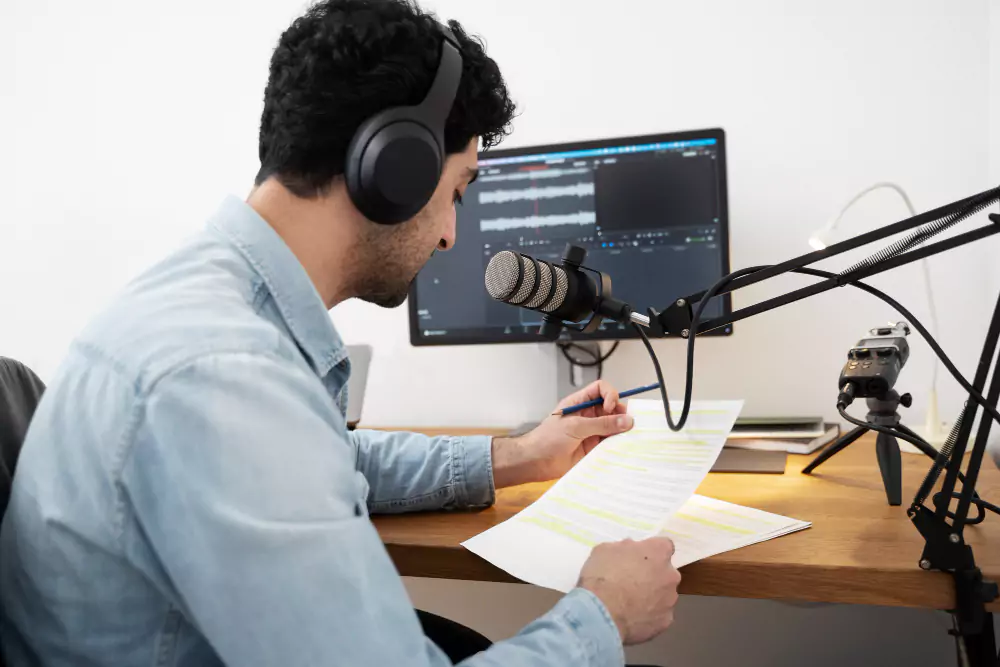
How to Write a Voice Over Script
by Oliver Goodwin | October 20, 2023
Reading Time: 6 minutes

Have you ever had your sentences misunderstood because of how they were expressed? Yes, it happens to most of us. There are branches of literature, such as Speech-Act Theory and Discourse Analysis, that extensively discuss words, how they are expressed and perceived, and the unspoken agreement reached between the speaker and the hearer.
Before you speak, there are considerations that you must factor into your utterances: breathing, pronunciation, the cultural and ethnic background of the listener, pauses, etc. This principle can also be applied to voice-over scripts.
For instance, when writing voice-over scripts for a business, the difference between good and bad audio content may be the absence of a punctuation mark. To illustrate this, consider this scenario:
A voice-over script writer intends to write: “Fast Delivery: Order Today, Receive Tomorrow!” However, due to a punctuation error, the message appears as “Fast Delivery Order Today, Receive Tomorrow!” When read aloud, the first is an everyday promise of unfailing next-day deliveries. The second one, however, tells customers to place their order that very day, signifying a sense of urgency.
But this is only one of the numerous pitfalls that are bound to happen when you do not take the right steps to write your voice-over scripts. In this post, we have curated:
- Ten tips to help you write killer voice-over scripts.
- Common errors to avoid when writing voice-over scripts.
- What a voice-over script should look like.
10 Tips To Help You Write Killer Voice-Over Scripts

Crafting an effective voiceover script is an art that combines storytelling, persuasion, and emotion. This article will explore ten tips to help you write a voiceover script that captivates your listeners.
1. Know Your Audience
Understanding your audience is valuable in the world of voiceovers; it is the secret sauce to creating a script that resonates, captivates, and ultimately converts.
For example, picture a voiceover script loaded with intricate industry jargon for a teenage audience. It is a disconnect; the script sails over their heads, failing to engage. Conversely, overloading a script with youthful slang may thrill young listeners but leave mature audiences puzzled.
The significance lies in the nuances. Different age groups, demographics, and regional cultures have distinct linguistic preferences and dialects. A script mismatch can lead to misunderstanding, misinterpretation, or disengagement.
Understanding your audience’s lingo, buzzwords, and culture is essential to creating a truly connected script. This is why opting for a voice cloning service like Synthesys Studio is important.
Synthesys Studio, with 451 human voices, over 140 languages, and 300 accents, makes it possible to tailor your script to perfection. This versatility ensures your message resonates regardless of linguistic or cultural background.
2. Define Your Message—The Power of Clarity
Defining your message in your voiceover script is the compass guiding your narrative. Imagine a travel documentary script without a defined message. It becomes a chaotic wander through facts without purpose. The same applies to an advertisement – it becomes an aimless noise without a clear message.
A defined message is the cornerstone of any effective script, ensuring that every word serves a purpose and resonates with your audience.
3. Start With a Hook—Captivate from the First Word
Your voiceover script’s opening moments are make-or-break. Imagine a movie without an intriguing opening scene—the audience drifts. Similarly, your script’s start is the handshake, the invitation to engage. It can be a fascinating fact, a relatable story, or a compelling question.
It is your chance to pull your audience into your narrative, making them eager to hear more. Start with a hook, and you will have their full attention from the very first word.
4. Keep It Concise—Brevity is Powerful
When writing your voiceover scripts, less is often more. Think of your script as a roadmap; it should be clear and straightforward. Eliminate wordiness and focus on the essentials.
Just like a succinct GPS route, a concise script ensures that your audience arrives at their destination—the core message—efficiently.
Brevity respects your audience’s time and leaves them with a memorable experience, all within a brief timeframe.
5. Embrace the Power of Pacing
Pacing is your secret weapon in voiceover scripts. Let us examine two versions of a script for a car commercial:
The first, “Introducing the sleek and powerful new model, engineered for speed, performance, and comfort. Get behind the wheel today!” rushes through key selling points, leaving the audience overwhelmed. In contrast, the second version, “Get behind the wheel today and experience the sleek and powerful new model, engineered for speed and performance, yet remarkably comfortable.” uses a well-paced choice and arrangement of words, creating a rhythm akin to a smooth flowing river.
Correct pacing maintains engagement, allowing your message to unfold naturally and effectively.
6. Tell a Story
Voiceover scripts are more than words; they are stories waiting to be told. Storytelling engages, inspires, and leaves a lasting impression. It is a journey your audience embarks on, where they connect with characters, feel conflicts, and enjoy resolutions.
The power of stories is unmatched in making your message memorable. When crafting for your voice-over, becoming a storyteller can transform your script into an experience your audience will not forget.
7. Create a Visual Journey—Paint with Words
Voiceover scripts are more than spoken words; they are brushstrokes on an auditory canvas.
Consider two versions of a script for a travel documentary: The first, “They explored the city.” is plain. In contrast, the second version, “They ventured through the city’s bustling streets, where vibrant markets and historic architecture unfolded at every turn.” creates a vivid visual journey, immersing your audience in the city’s sights and sounds.
It is about crafting an experience that’s vivid, immersive, and unforgettable. By creating a visual journey, your script becomes a window into another world, and your audience is ready to step through it.
8. Be Conversational—Speak Like a Friend
Voiceover scripts should sound like a friendly chat. Imagine two product descriptions. The first, “This incredible device features revolutionary technology.” feels robotic. In contrast, the second, “This device is pretty amazing because it’s got this cool new tech.” is approachable, relatable, and conversational.
Your script should be like the second version, making the audience feel like they are listening to a friend.
9. Be Conversational—Speak Like a Friend
Editing and revising are where scripts truly shine. It is about more than just grammar; it ensures that punctuation, semantics, and syntax work harmoniously. Eliminate ambiguity and redundancy, and make your script a polished gem.
Incorporate genuine emotion into your script. Emotions have the power to connect, engage, and leave a lasting impact.
When crafting a script, think beyond words; consider how those words should be spoken to convey the right emotions.
With Synthesys Studio’s advanced voiceover generator, you can ensure your voiceovers sound lifelike and authentic, infusing nuances that resonate with empathy, enthusiasm, or excitement. This human touch transforms your script into a captivating narrative that truly moves your audience.
Common Errors To Avoid When Writing Voice-Over Scripts

When writing voice-over scripts, you are likely to fall into the trap of writing the way we would if a human were reading it. Below are common mistakes that you must avoid at all costs:
- Figures: If you must include figures in your script, write them the way they are to be pronounced—as they are. Figures here include dates, decimals, fractions, integers, phone numbers, etc. “2/4”, for instance, would be pronounced “two-slash-four” by a human but not by a machine. This means that your writing must resonate with exactly how it is meant to sound: “two-slash-four”.
- Abbreviations: When writing abbreviations, it is important to follow the same guidelines as mentioned for figures, except this time, you have to know what an abbreviation truly means. For instance, you cannot write “i.e”; rather, you write “in other words”. Similarly, writing “Mister” instead of “Mr.” would help greatly.
Example of What a Voice-Over Script Should Look Like

Supposing you want Synthesys Studio to generate a speech using your cloned voice saying, “My name is Mr. Synthesys, and I was born on 01/01/1984.” here is how it would be written:
“My name is Mister Synthesys, and I was born on January One Nineteen-Eighty-Four.”
The advantage of using Synthesys Studio is that you get to specify where to include your pauses and their lengths. You also enjoy the privilege of adjusting the speed of your output.
Conclusion
In the dynamic world of voiceover scripting, we have explored the ten pivotal steps that turn words into captivating narratives. From understanding your audience to crafting engaging stories and maintaining a conversational tone, these are the tools of our trade.
Yet, the true heartbeat of every remarkable script is emotion. Emotions bridge the gap between words and hearts, forging connections and leaving lasting impressions.
This is where Synthesys Studio comes into play. With its advanced technology and diverse range of human voices, languages, and accents, it adds an unparalleled layer of authenticity to your scripts.
Emotions are your most potent tool, and Synthesys Studio is your ally in creating evocative, impactful storytelling.




